Humans are supposed to brush and floss twice a day. We even have fancy products and tools like mouthwash, water flossers, electric toothbrushes, and polishers. We put a lot of effort into dental care for ourselves, but what about our sharp-teethed companions?
This February, in honor of Pet Dental Health Month, we want to talk about the importance of consistent dental care and share some strategies to keep your pet's teeth clean and healthy.
Why Is Your Pet's Dental Health Important?
There are several reasons that you should prioritize your pet's dental health. Some of these reasons are surface-level/superficial, such as the way your dog or cat's teeth look and how their breath smells, but the importance of dental health goes much deeper than this.
Poor dental health can lead to gum inflammation, situational pain (while chewing or playing with toys), chronic pain, tooth decay and death, periodontal disease, and increased risk of severe ailments like kidney and liver disease and congestive heart failure.
How is it possible that poor dental hygiene could lead to potentially fatal diseases? Inflammation in your pet's mouth is not only uncomfortable but can also act as a direct conduit for bacteria to get into the bloodstream. That bacteria can then take root in other organs like the kidneys and liver.
Another major concern regarding your cat or dog's dental health is their nutrition and appetite. If your pet experiences pain when trying to eat, they may avoid eating whenever possible. If you've ever had a toothache, you know how challenging mealtimes can be! Unfortunately for our dear companions, they can't call up the dentist and make an appointment. It's up to us to notice the signs of dental pain and get them the help they need.
Even more, unfortunately, dental diseases are incredibly common in both dogs and cats, with an estimated two-thirds of dogs over three years old and 50 to 90% of cats over four years old suffering from some level of gingivitis or periodontitis. Here are some potential signs that your dog or cat is having dental issues that need to be addressed:
- Reduced appetite or changes in appetite (only eating soft foods)
- Chewing very slowly or being unable to keep food in the mouth while chewing
- Swollen or discolored gums/gums that bleed easily
- Really bad breath
- Unusual behaviors such as excessive drooling, whining while chewing or yawning, constant licking of their lips or nose
- Mood changes, lack of energy, sad disposition
- The presence of excess plaque or discolored teeth
- New or worsening sensitivity to having their face or mouth area touched
If your dog or cat displays any of these symptoms, it's a good idea to visit your vet to get their dental health checked out. Of course, no one wants to see their pet in pain or risk their health, so the best course of action is to focus on prevention.
Practices and Products to Support Your Pet's Dental Health
There are a lot of simple things you can add to your pet's routine that can keep their teeth healthy and chomping away well into old age. Outlined below are some methods, products, and practices that can help sustain your dog or cat’s dental health.
Dental Chews and Treats
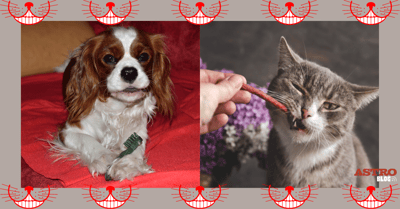
When your pet chews on a dental bone or treat, it helps prevent tartar buildup by scraping their teeth as they chew. Some products also have enzymes that reduce bacteria that cause bad breath. The effectiveness varies depending on the product, but high-quality dental chews can reportedly reduce oral bacteria in dogs by 60 to 70%.
Cats usually aren’t as excited about chewing as dogs are, but there are dental treat options for cats that help partially remove plaque in the same way dental chews do for dogs. It’s important to look at the ingredients of your pet’s dental products to ensure there aren’t a lot of chemicals and artificial additives.
Though dental chews can be a lovely addition to your dog or cat’s treat allotment for the day and can help prevent plaque buildup, regular brushing and dental checkups at the vet are still a must.
Brushing
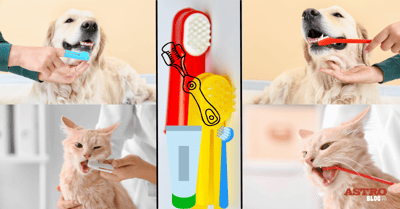
Both dogs and cats can greatly benefit from consistent toothbrushing. In fact, many veterinarians suggest that brushing your pet's teeth daily (or even twice a day) is the best way to maintain their dental health, but brushing three times a week is the minimum recommended amount.
If your cat or dog isn't used to the toothbrushing process, they may feel uncomfortable at first. Starting a brushing routine early on in your pet's life is one of the best ways to ensure they are comfortable with it. Going slowly and getting your pet used to the feeling of your finger or a cloth going over their teeth can be a great first step.
For regular brushing, you will need a soft-bristled toothbrush, and if your pet likes it, specially made cat or dog toothpaste (not human toothpaste). Gently lift your pet's lips and lightly brush their teeth to avoid irritating their gums. Getting your pet used to tooth brushing is a process, so don't be discouraged if you only get a few teeth brushed at a time in the beginning.
Probiotics
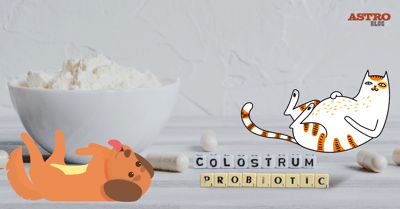 In humans, probiotics are purported to have a number of benefits on oral health, such as preventing periodontal disease, oral infections, and gingivitis. Probiotics may also have the same positive effects on pets. A probiotic supplement can support oral health by maintaining the mouth's microbiome and preventing the overgrowth of "bad" bacteria.
In humans, probiotics are purported to have a number of benefits on oral health, such as preventing periodontal disease, oral infections, and gingivitis. Probiotics may also have the same positive effects on pets. A probiotic supplement can support oral health by maintaining the mouth's microbiome and preventing the overgrowth of "bad" bacteria.
Colostrum
Colostrum is the first milk that mammals produce after giving birth. This substance is full of nutrients that help the mother's infant develop normally, build an immune system, digest food properly, and so much more.
When given in a supplemental form to our pets, colostrum can help improve their immune responses, support tissue health, help with digestion and gastrointestinal disorders, and more. Using colostrum as a health supplement may also help reduce your pet's bad breath and prevent oral infections and dental diseases.
Herbs
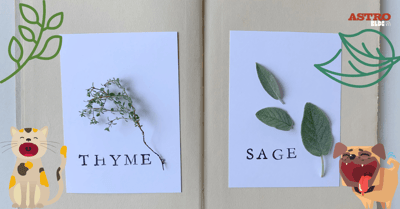
Many herbs, such as thyme and sage, have anti-microbial properties that can support your pet's holistic dental health and treat bad breath. For example, oils, tinctures, and pastes containing sage and thyme herbal blends can help treat or prevent gingivitis and reduce inflammation and bacterial growth.
Just like dental chews, herbal products made with safe and natural ingredients can be a great addition to your pet's regular dental health regimen, but it isn't a replacement for brushing or vet visits.
Raw Bones
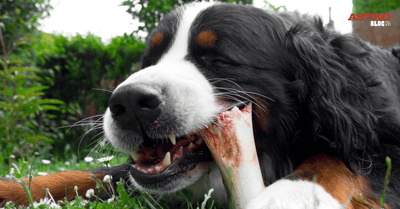
In the wild, canines and felines eat raw bones regularly. This is what helps keep their teeth clean and healthy. Chewing through different materials can clean in between their teeth and prevent plaque from forming. Though it often comes as a surprise to many pet owners, your dog or cat can have raw bones, preferably with extra meat on them.
Feeding raw (never cooked!) bones to your dog or cat can benefit their health in a multitude of ways. The nutrients from the meat and the bone can make your pet's bones and teeth stronger and improve their digestive health. In addition, the mechanical action of gnawing on a bone has been shown to effectively remove plaque and tartar from your pet’s teeth, and it can also help maintain gum health by improving blood circulation.
There are a few guidelines you should follow if you give your pet a raw bone:
- Don’t give pets cooked bones. Cooked bones are brittle and can splinter, puncturing your pet's mouth, stomach, or intestines.
- Size matters. An 8-pound cat should get a much smaller bone than an 80-pound dog. Bone size should accommodate jaw size and strength.
- Keep a watchful eye when feeding bones. Choking is always a concern, especially if your pet is new to the raw bone lifestyle.
In Conclusion
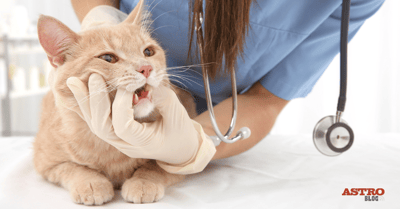
It's a common misconception that our pets don't need a similar level of dental care to humans. Our dogs and cats don't have entirely self-cleaning mouths, and their modern diets often aren't optimized for dental health, so they need consistent dental care to ensure healthy mouths and teeth.
So many pets have dental issues that go unnoticed, which can lead to pain and long-term health issues. To keep your pet happy and feeling good for longer, taking care of their teeth and gums is vital.
In addition to regular vet check-ups, toothbrushing and feeding raw bones are two of the best ways to prevent plaque buildup and keep teeth and gums strong and in good condition. Herbal blends, dental chews, probiotics, and colostrum can also be great additions to your pet's dental care routine.
Written & Provided by Katherine Carbonaro
